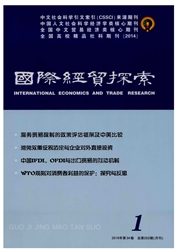

 中文摘要:
中文摘要:
文章将交易成本概念引入区域一体化组织形态比较这一领域中。根据交易成本经济学的基本理论构建的理论分析框架,用中间性组织的竞合关系演变以及事前交易成本和事后交易成本概念分析了选择不同组织形态的原因。指出深层次一体化组织以合作为主,虽然事后交易成本小,但是事前交易成本过高。随后结合中国选择区域一体化组织形态的目标和现实约束建议中国从组建浅层次、双边的、灵活的一体化组织入手,坚持制度化、封闭型的原则,尽快实施一体化战略。
 英文摘要:
英文摘要:
Introducing the concept of transaction cost into the comparative analysis of different forms of Regional Integration Organizations (RIOs), the thesis puts forward a new framework and analyzes the reasons why different countries select different forms by using the competition-cooperation evolution interpreted by the inter-firm organization theory and the concept of pre-transaction cost and ex-transaction cost. It indicates that the deep integration mainly represents the close cooperation, and that although the ex-transaction cost is relatively small, the pre-transaction cost is huge. Lastly, based on China's targets and constraints in the selection of regional integration forms, it suggests that China should start with the shallow, bilateral and flexible forms, and insist on the principle of institutional and close type, so as to implement the regional integration strategy as soon as possible.
 同期刊论文项目
同期刊论文项目
 同项目期刊论文
同项目期刊论文
 期刊信息
期刊信息
